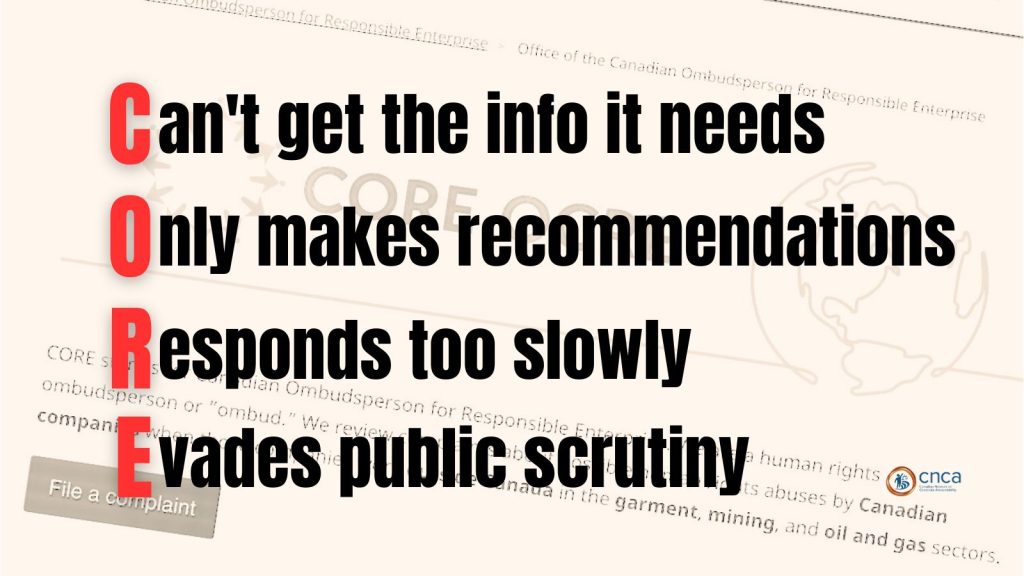Today the Canadian Ombudsperson for Responsible Enterprise (CORE) announced new ‘investigations’ into allegations that Canadian companies benefited from the forced labour of Uyghurs in East Turkestan (also known as Xinjiang, China). This announcement comes over a year after concerned civil society groups filed complaints with the office. Not only have the complainants been left waiting, but the CORE’s ‘investigations’ will likely prove to be fruitless, as the office is still without the power to compel company documents and testimony.
The CNCA has long called on the Government of Canada to equip the CORE with robust investigatory powers. Without these powers, the CORE lacks credibility and people harmed are without the effective ombudsperson that Canada once promised.
Context
On July 11, the CORE released initial assessment reports into complaints concerning allegations that Nike Canada dealt with suppliers that used or benefitted from the forced labour of Uyghurs in its Chinese supply chains, and that Dynasty Gold Corp. benefitted from forced labour at a mine in China in which it holds a majority interest.
On August 15, the CORE published more initial assessment reports about allegations that Ralph Lauren Canada has supply relationships with Chinese companies that use or benefit from the use of Uyghur forced labour, and that Canadian mining company GobiMin benefitted from the use of Uyghur forced labour at its Sawayaerdun mine in East Turkestan (also known as Xinjiang).
Today, the CORE made a similar announcement concerning Uyghur forced labour and the Canadian companies Walmart Canada, Hugo Boss Canada, and Diesel Canada Inc.
However these companies, and others about which the CORE may announce future ‘investigations’, have little to fear because the CORE has four major problems:
-
- the CORE can’t get the information it needs;
- the CORE can’t do much with the information it gets;
- the CORE responds to complaints too slowly; and
- Canadians can’t hold the CORE to account.
Problem 1: The CORE can’t get the information it needs
The CORE’s first problem is that it won’t be able to get the information it needs to determine whether forced labour or other human rights abuses have actually taken place.
The Government of Canada never gave the CORE the powers to compel documents or testimony, despite experts – including the government’s own experts – agreeing that the CORE needs these powers to be effective, and despite the Ombusperson herself saying her office should have these essential powers. The Canadian government’s experts confirm that the CORE does not have sufficient tools to engage in credible and effective investigations.
Small wonder that companies named by the CORE have reportedly failed to participate in the complaint process: they are under no legal obligation to cooperate with the investigations. Without the ability to compel documents or testimony, there is little the CORE can do to get the information it needs.
And, even if investigators had direct access to witnesses, many people who have faced harm might choose not to speak to the CORE because there are no adequate safeguards to protect people who file complaints from retaliation by the companies they complain about.
Problem 2: The CORE can’t do much with the information it gets
If the CORE somehow does get the information it needs to determine whether these companies have contributed to human rights abuse, what then?
The CORE can merely recommend that Ottawa not give trade or financial support to the companies.
However, the government is under no obligation to follow those recommendations. On the contrary, Canada has a track record of offering diplomatic support to Canadian corporations linked to allegations of human rights abuse, and has so far seized only one shipment of goods allegedly tainted by forced labour, which it later released. The USA has seized hundreds of shipments, by comparison.
Beyond making non-binding recommendations for limited and unlikely government action, the CORE may be hoping that public scrutiny encourages companies to act more responsibly.
However, public scrutiny often has little effect on corporate behaviour when it comes to protecting human rights.
For instance, Australia and the UK passed mandatory reporting laws designed to use the power of naming and shaming, but these have not reduced corporate human rights abuses, and are reportedly ineffective because they don’t place any legally binding standards on companies to undertake efforts to effectively address risks of labour exploitation in their business operations.
(In 2023, Canada followed the ineffective Australian/UK model with the Fighting Against Forced Labour and Child Labour in Supply Chains Act, previously Bill S-211, though the government has promised stronger legislation by the end of 2024.)
Problem 3: The CORE responds to complaints too slowly
Even if the CORE could get the information it needs, and then actually had the power to do something with that information, it would need to fix its slow and opaque operating processes to meaningfully serve people who come forward with allegations of harm.
Despite deeming 16 complaints admissible to date, the CORE has only published seven initial assessment reports. Publishing these first initial assessments took over a year.
The CORE has been called ‘slow’ and ‘ineffective’ and accused of creating a ‘process bogged down in bureaucracy’.
This lack of results is astounding given that the CORE has existed for 4 years, and currently has a staff of 20 people and an annual budget of $4.9 million, of which between $183,600 and $216,000 a year is earmarked for the Ombudsperson’s salary.
The CNCA has called for the CORE to be accountable to complainants by moving much faster when it receives complaints.
Problem 4: Canadians can’t hold the CORE to account
The CORE’s lack of action has been called out by the CNCA and others.
However, the CORE has been generally unresponsive when approached about its lack of results.
For instance, after Indigenous leaders from Peru testified that the CORE’s lack of powers made it unworthy of approaching, the CORE repeatedly made no one available for media interviews and answered media questions with direction to visit the CORE’s website.
And, for example, the public has not been told about why some complaints have been deemed ‘inadmissible’ for the CORE to examine further.
It seems the watchdog doesn’t want to be watched.
Solutions
With no effective powers to investigate, no ability to do something meaningful if its investigations reveal wrongdoing, and no track record of moving quickly or being transparent despite a big budget and staff, the CORE remains toothless.
Meanwhile, serious allegations of human rights abuses associated with Canadian company operations around the world continue, and Canada’s obligation to ensure that people’s rights are protected remains unfulfilled.
However, the CORE could be made effective: The Canadian government can and should deliver on its promise to empower the CORE, by giving it the powers to compel documents and testimony.
There are two ways to give the CORE these powers:
1. The government can pass a law like Bill C-263, already before Parliament, which would give the Ombudsperson (or similar Commissioner) the powers to:
-
- compel the witnesses and documents it needs to undertake robust investigations;
- fine people and companies who obstruct or mislead investigations.
When it comes to addressing the CORE’s lack of action and transparency, Bill C-263 would also require that the office submit an annual report to Parliament, including summaries of the complaints received and relevant investigations, and any recommended changes to Canadian law and government policy.
The government could also enact its own legislation based on Bill C-263, or based on the CNCA’s model legislation.
2. Even without legislation to create an effective ombudsperson, the Prime Minister’s cabinet can appoint the CORE as a Commissioner under the Inquiries Act by an Order in Council. That would give the Ombudsperson the key powers it needs to undertake effective investigations: the powers to
-
- summon witnesses, and
- require companies to hand over documents.
The CNCA has published a model Order in Council that the government could use.
The simple, quick fix of appointing the CORE as a Commissioner under the Inquiries Act would go a long way towards immediately making the CORE more effective.
Related media stories:
-
- Ralph Lauren Canada faces federal probe into alleged use of forced Uyghur labour, Steven Chase and Susan Krashinsky Robinson, The Globe & Mail, 15 August 2023.
- Nike Canada faces federal probe over allegations it uses forced Uyghur labour in China, Steven Chase and Susan Krashinsky Robinson and Tavia Grant, The Globe & Mail, 11 July 2023.
- Watchdog probing claims that Nike Canada, gold company benefiting from forced Uyghur labour, Catharine Tunney, CBC News, 11 July 2023.




